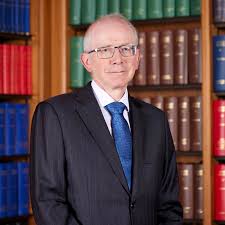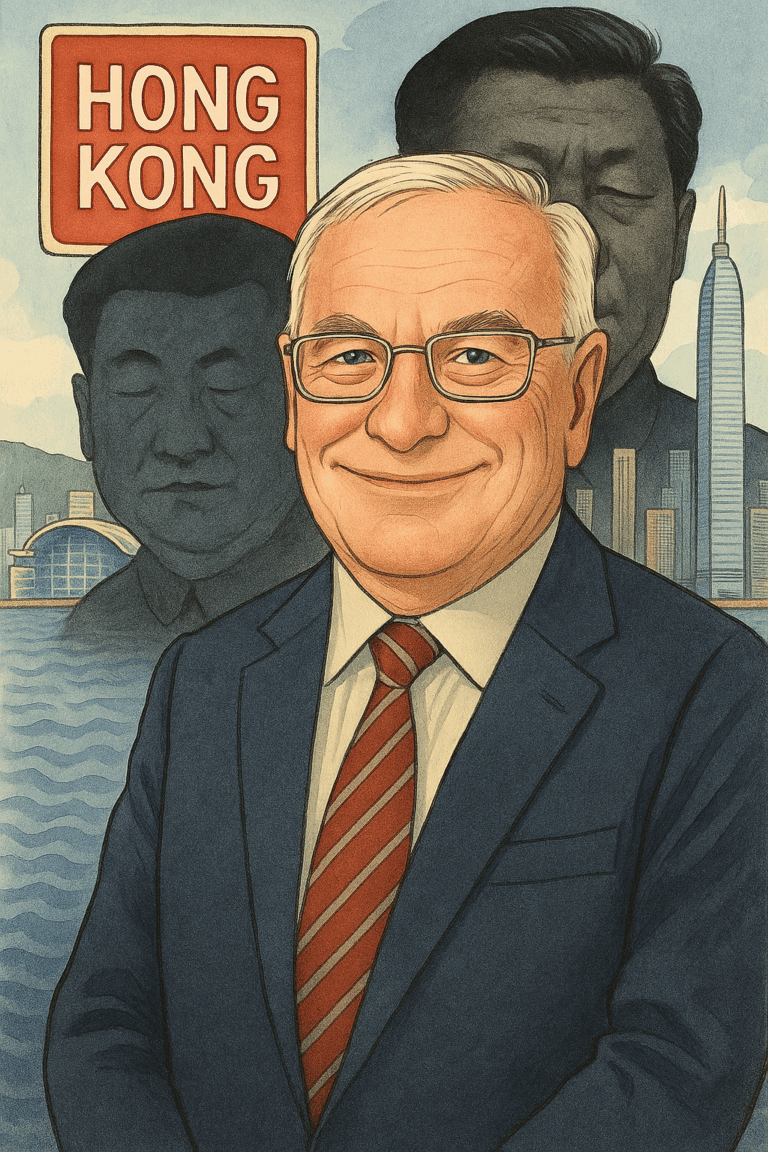What Is Sir William Young Thinking?
John Bowie, LawFuel publisher
There’s a moment in every legal career when the robes get a little too heavy, the wigs a little too itchy, and the temptation of a post-retirement international gig becomes irresistible. For Sir William Young, formerly of New Zealand’s Supreme Court, that moment appears to have arrived — and it’s led him straight into the smouldering cauldron that is Hong Kong’s judiciary.
China’s reassertment of control over the former British colony has not exactly created a beacon of hope for the once freedom-loving Hong Kong. To the contrary, its controversial National Security Law, imposed five years ago, has created yet another jurisdiction where free expression is a luxury best used elsewhere.
It’s all very North Korea, with rampant electronic monitoring undertaken by the country that has mastered that AI-leveraged dark art, seeing poor-choice tee-shirts or signs of disrespect towards the China-lead authoritarians have around 800 people frogmarched to jail.
Free speech and its appendages have been scattered to the wind like flakes from a cheap spring roll.
And into that bastion of dashed hopes and political overreach marches the once-esteemed New Zealand Supreme Court Justice Sir William (Willie) Young.
His appointment by the Hong Kong Legislative Council comes amid a veritable exodus of foreign legal grandees who, having once lent the court a veneer of common law respectability, are now fleeing faster than a pig hearing the words ‘crispy belly’.
British judges took the lion’s share of appointments to the Hong Kong bench following its 1997 handover with Beijing. But British judges who might be candidates for the Hong Kong bench are now in very short supply given their reluctance to engage in the Made in China anti-freedom laws they would be constrained to enforce.
One can imagine the Judicial Committee of the Hong Kong Council scratching their heads wondering what other gweilo they can attract to the bench, given the judicial exodus.
“Sumption no good for us,” they might have said. “Canada’s bad. Australia or New Zealand, maybe?”
“No High Court hacks, we need a top court guy,” would have come the rejoinder.
“Top court. Try Villy Young from New Zealand, he left Dubai but may be on the looksee for a us. Love’s tennis, top court man”.
“Good. Get him a Country Club place and plane ticket.”
Job done.
Judicial Roll Call of the Disenchanted
Let’s take a roll call of the departed: Lords Reed and Hodge of the UK’s Supreme Court pulled out in 2022, citing the obvious, that the National Security Law imposed by Beijing was undermining judicial independence.

Most recently, Lord Sumption, not exactly a bleeding-heart liberal ,stormed out, writing in the Financial Times that Hong Kong is “sliding into a totalitarian state.”

Lord Reed, (pictured) President of the Supreme Court of the UK, quit the court in 2022, reported in The Times saying “the judges of the Supreme Court cannot continue to sit in Hong Kong without appearing to endorse an administration which has departed from values of political freedom, and freedom of expression, to which the justices of the Supreme Court are deeply committed”.
Lord Reed’s departure was accompanied by another eminent UK jurist Lord Hodge, worried about Hong Kong’s security law changes.
Lord Collins followed, referencing Hong Kong’s “political situation.”
Even Beverley McLachlin, former Chief Justice of Canada, has made her exit, albeit quietly.
Pension-Padding And Vainglory
So what on earth is Sir William thinking? Is it principle, paycheque, or just post-retirement boredom? Could it be money alone – after all, the reported monthly sitting fee is USD50,000 plus necessary travel and other expenses.
But it can’t be moolah, surely? Can it?
That’s a lot more than Sir William could garner from one of his five other, recent appointments, such as sitting on the Court of Appeal in such tropical locales as the Seychelles, Samoa and Fiji.
Such appointments are common enough pension-padding gigs of local retired jurists, a warm climate ‘perk of office’, as if more were needed, providing some winter warmth and wallet-growth from the chilly climes of Remuera, Kelburn or Fendalton.
But Sir William is not seeking sinecures abroad for the sake of it. Surely. Perhaps he fancies himself the legal equivalent of David Attenborough, stepping into hostile territory in order to study the endangered species that is judicial independence in Hong Kong.

Or maybe he believes, against the odds, that by staying he can protect the integrity of the court from the inside — a sort of Gandalf on the bench, standing alone against the shadow of Mordor.
And also something that none of his eminent colleagues felt they were able to achieve.
While noble intentions are plausible, they are increasingly hard to justify. The court is no longer just a bastion of commercial dispute resolution. It is now a platform for rubber-stamping political prosecutions, where even the Hong Kong 47 – pro-democracy activists jailed for running in an election – are sacrificed in the name of “national security.”
Judges aren’t merely refereeing; they’re being conscripted as foot soldiers in a very political war.
New Zealand lawyers, traditionally fond of independence, restraint, and keeping their noses out of imperial leftovers, might rightly ask: why would one of our own sign up to play court jester in a legal opera now directed from Beijing?
There’s no easy answer. But there is a growing chorus, from the IBA to academics like Michael Davis, a previous law professor at the University of Hong Kong arguing that foreign judges risk legitimising a system no longer worthy of the term “rule of law.”
Mark Clifford, president of Committee for Freedom in Hong Kong, asked similar questions of Sir William in a recent newspaper opinion piece.
Sir William Young is a judge of great intellect and reputation. That’s what makes this move all the more confounding and also all the more important to question. When even the British aristocracy of the law is walking out, perhaps it’s time to ask why a Kiwi knight would walk in.
After all, even the best judges must occasionally learn when to recuse themselves — not just from a case, but from complicity in the dark and doleful place that Hong Kong has become, playing fiddle for Xi Jingping.
